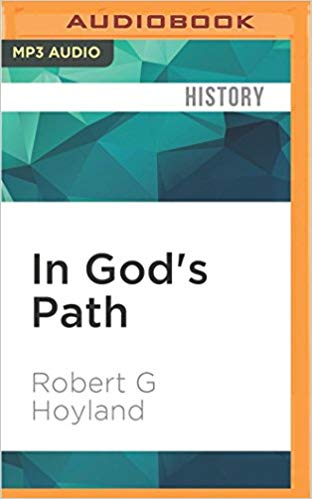In God’s Path: The Arab Conquests and the Creation of an Islamic Empire Audiobook by Robert G Hoyland

text
There have actually been a number of outstanding publications over the last few years re-appraising the “Rise of Islam”; especially Hugh Kennedy’s The Wonderful Arab Conquests, Peter Sarris’s Empires of Confidence: The Autumn of Rome to the Surge of Islam, David Levering Lewis’s God’s Crucible as well as Tamim Ansary’s Fate Disrupted: A History of the Globe Via Islamic Eyes.
The standard sight– that a “tsunami” of theologically zealous former wanderers appeared out of the barbarian bayou of the Arabian desert, and capitalised on the fatigue of the two local superpowers, Christian Byzantium as well as Sassanian Persia, who had been locked in a cold war for a generation, prior to brushing up all ahead of them with the knife as well as the Qur’an– is no longer viable.
This view derives from Christian accounts depicting Islam as a divinely selected scourge, filtered through Edward Gibbon’s Decline and Fall of the Roman Realm, which paralleled the “oriental” attack on Constantinople, with the Vandal and Visigoth strike on Rome in the century ahead of time: overblown, ponderous, decadent empires reversed by nimble, prudent killers. In God’s Path: The Arab Conquests and the Creation of an Islamic Empire Audiobook by Robert G Hoyland Free. This “Eurocentrism” has had its day (for one thing, Constantinople stood till 1453: the real scalp of the Arabic intrusion of 630 onwards was the Persian funding of Seleucia-Ctesiphon). However given how crowded this field is, what new insight does Hoyland bring?
A lot is the short answer. This is a succinct, smart overview to the duration, alert to subtlety and mindful concerning grand theories.
It also does 2 almost inconsistent points. Hoyland makes use of the earliest feasible sources. One may think this is simply conventional method, yet the Islamic sources have a tendency to be a lot later on, and revisionist histories have been altered by a certain divide in between scholars of Islam and Arabic as well as scholars of very early Christianity and late antiquity. Background is not constantly composed by the victors, as well as the very early sources– not just Christian as well as Western– provide fascinating verifications and contradictions.
Lots of authors talk about the rate of the Arabic conquest, as if alarmed that some camel-riding converts could topple kingdoms so quickly. Hoyland unpicks this stereotype.
Firstly, individuals of the Arabic peninsula were not so utterly sequestered from local national politics. As sellers, they traded with both Persia and Byzantium (and also various other smaller states); as soldiers they lent support to one or opposite as appeared to their best benefit (the Turks, Armenians as well as Berbers did the very same); as individuals interested concerning monotheism they clearly had contact with Christian groups both orthodox and also heretical (the Qur’a consists of a tale about the early stage of Jesus just discovered in other places in the earlier Gospel of Thomas).
Second of all, it is not a lot the rate yet the protection of the occupation that is conspicuous. At its biggest degree, around the middle of the 8th century, the Islamic Empire extended from the Pyrenees to Samarkand, from Yemen to the Caspian and also Black Seas. The globe’s 5th biggest land realm ever before was carved out in a simple 120 years. The Mongols may have conquered much more, more quickly, yet they assimilated faster too– so of Genghis Khan’s grandchildren, Kublai Khan became Chinese, Chagatai Khan became Iranian, Tolui Khan stayed in the Mongol homeland and Batu Khan and also his brothers held region from Siberia to the Danube. By comparison, after Mu’awaiya came to be Caliph, maintaining territory and keeping the unique identity of the “Muslims”, was paramount.
As a unitary empire, it untangled relatively promptly, with the Umayyad rump in Spain seceding from the Baghdad-centred as well as Abbasid dynasty rump in 750, as well as a collection of local defections to neighborhood leaders after that. That there was only briefly a linked “Dar al-Islam” reveals a more paradox. In God’s Path: The Arab Conquests and the Creation of an Islamic Empire Audio Book Online. The “Home of Tranquility” was as modern as the “Dar al-Harb” it opposed. The elite of the nascent realm might have been Arabic and Islamic; its brand-new lieges– commonly safeguarded by tax reliefs, clemency, or refined settlements concerning becoming middle men or spies– were not. Among the first states to transform to the Prophet’s message was the Himyarite Jewish rulership in Yemen: among the last states in this duration to ward off the Muslim intrusion was the Jewish Khaganate of the Khazars. The troops who took Egypt were as dumbstruck by the accomplishments of design they found as would certainly Charles Martel’s troops be when they found amongst the spoils of the Battle of Poitiers/Tours in 732 Arabic equestrian modern technology. The 9th century rewrote the intricacy of the earlier duration, and also, as constantly, lack of obscurity involved calcification of point of view.